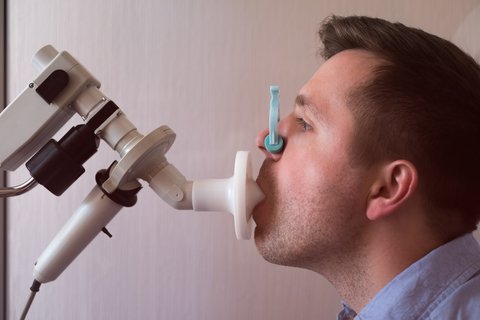Breath Testing for Mesothelioma: Not Yet Ready for Widespread Use?

Breath testing for mesothelioma may be a promising new way to catch asbestos cancer early. But Italian researchers are warning that there is not yet enough research to recommend widespread use of the technique.
Malignant pleural mesothelioma is a virulent and hard-to-treat cancer. Researchers around the world continue to search for faster, easier ways to diagnose and treat it.
Breath testing for mesothelioma is one proposed method. Special machines measure volatile organic compounds (VOCs) in patients’ exhaled breath. VOCs can give doctors important information about cellular metabolism and can indicate the presence of cancer.
But researchers at Italy’s University of Bari analyzed all of the studies on breath testing for mesothelioma since 2000. They say none of the studies are big enough to apply the findings to other mesothelioma patients.
Advantages of Breath Testing for Mesothelioma
Cancer causes biochemical changes in the body. These biochemical changes produce VOCs that a person exhales. Different types of cancer produce different combinations of VOCs. Breath testing for mesothelioma measures these VOCs to see what type of cancer produced them.
Using exhaled breath to learn more about what is going on internally is called breathomics. In a 2017 European study, one type of breath test was 100 percent accurate at identifying mesothelioma. The same technology accurately ruled out mesothelioma 91 percent of the time.
Besides accuracy, a big advantage of breathomics is that it is simple and painless. Researchers say people are more likely to have a mesothelioma screening test that does not involve a needle or a scalpel.
Breath testing for mesothelioma is also less expensive and faster than tests for biomarkers in the blood or lung fluid.
Too Many Unknowns Around Breathomics
Even though there are advantages to breath testing for mesothelioma, the Italian team says there is not enough proof that it works. The biggest problem is the small size of most of the mesothelioma breathomics studies.
“Despite the promising results and diagnostic accuracy, conclusions cannot be generalized due to the limited number of individuals included in each cohort study,” writes study author Annamaria Catino.
Another problem with the studies on breath testing for mesothelioma is that they have not been externally validated. That means that other institutions have not yet produced the same results. External validation is one way to prove that new technology works.
The Italian researchers conclude the report by calling for more larger studies on breath testing for mesothelioma. Meanwhile, a UK breathomics study of 1,500 cancer patients is ongoing. Results from that study could have an impact on mesothelioma care in the future.
Sources:
Catino, A, et al, “Breath Analysis: A Systematic Review of Volatile Organic Compounds (VOCs) in Diagnostic and Therapeutic Management of Pleural Mesothelioma”, June 14, 2019, Cancers, https://www.mdpi.com/2072-6694/11/6/831
Lamote, K, et al, “Breath analysis by gas chromatography-mass spectrometry and electronic nose to screen for pleural mesothelioma: a cross-sectional case-control study”, September 27, 2017, Oncotarget, pp. 91593-91602
Von Radowitz, John, “Breath test that could revolutionise cancer diagnosis to be trialled in Britain”, January 3, 2019, The Independent, https://www.independent.co.uk/news/health/cancer-breath-test-breathalyser-molecules-liver-prostate-kidney-bladder-pancreatic-a8708861.html





